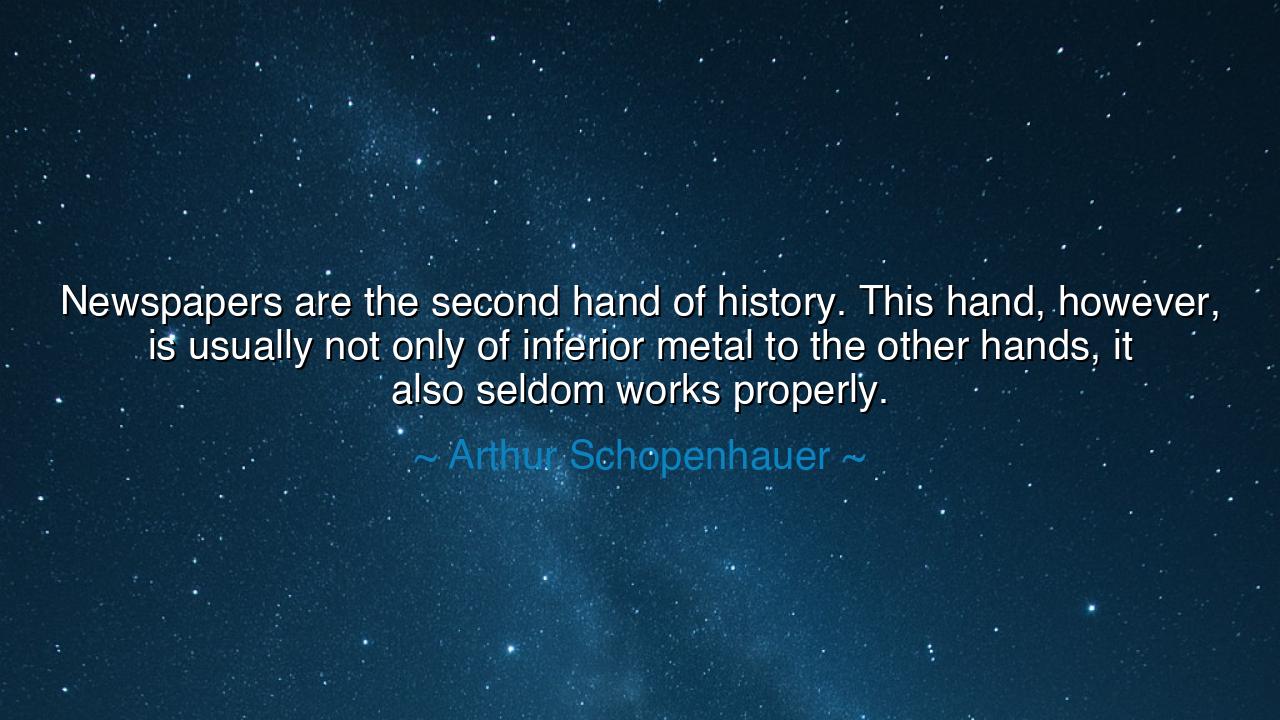
Newspapers are the second hand of history. This hand, however, is
Newspapers are the second hand of history. This hand, however, is usually not only of inferior metal to the other hands, it also seldom works properly.






“Newspapers are the second hand of history. This hand, however, is usually not only of inferior metal to the other hands, it also seldom works properly.” – Arthur Schopenhauer
Thus spoke Arthur Schopenhauer, philosopher of the inner life, who saw beneath the glittering surface of his age the restless pulse of illusion. In this saying, he lays bare a truth that transcends centuries — that what we call news is but a fleeting shadow of history, a pale and trembling reflection of events whose full meaning can only be known when the dust has settled. The newspaper, he warns, is the “second hand” upon the clock of time — the hand that moves fast, measures moments, and clamors for attention, yet is made of inferior metal, prone to error and distortion. The true measure of history, he implies, lies not in the noise of the present, but in the patient wisdom that comes after.
In Schopenhauer’s era, the world was awakening to the power of the press. The printing press had given humanity a new tongue — swift, sharp, and persuasive. Empires trembled at the written word; revolutions ignited from ink and paper. Yet the philosopher, ever wary of appearances, saw danger in this immediacy. For the newspaper, though mighty, is bound by the passions of its day — politics, profit, and public opinion. It records not the truth of history, but the sensation of the moment. What today’s headlines proclaim with fire, tomorrow’s historians may regard with a sigh. Thus, the second hand of history may tick, but not always tell the right time.
Consider, for example, the French Revolution. In those turbulent days, pamphlets and papers flooded Paris like a rising tide. Each claimed to bear the truth — one declaring liberty, another denouncing treason. Names once praised in print became cursed within months. The press exalted heroes and condemned them to the guillotine in the same breath. To read the newspapers of that time is to hear the roar of the storm, but not to see its cause. Only years later did the world come to understand the Revolution’s true meaning: not the chaos described in print, but the birth pangs of modern freedom. Thus Schopenhauer’s warning reveals itself — that the first record of history is seldom its truest.
The inferior metal of which he speaks is not paper or ink, but the weakness of human nature itself. Reporters, editors, readers — all are caught in the web of desire and fear. The newspaper must please the crowd to survive; it must move quickly, even if it stumbles in accuracy. It magnifies the trivial and overlooks the profound. It praises with one hand and destroys with the other. And so, while it claims to tell the story of the world, it often merely reflects the confusion of the hour. Only the calm eye of posterity can discern what truly mattered.
Yet Schopenhauer’s words are not merely criticism; they are counsel. He teaches us to seek depth over immediacy, to read not only with the eyes but with discernment. The wise man does not reject the newspaper, but he reads it as a sailor reads the waves — knowing they reveal only the surface of a vast and hidden sea. The wise reader asks: “Who benefits from this story? What voice is missing? What lies beneath this tone of certainty?” For the philosopher of truth must be skeptical of every claim that arrives too quickly, too neatly, too loudly.
In our age, where the second hand of history has become multiplied a thousandfold — through screens, broadcasts, and the endless scroll of information — Schopenhauer’s insight burns brighter than ever. The speed of knowledge has increased, but its wisdom has not. The clock now moves faster, but the hands are more fragile still. We live surrounded by voices that tell us what to think, what to fear, what to celebrate — and yet, like travelers in a fog, we see only shapes and shadows. The ancient warning remains: beware the false clock that tells the wrong time with perfect confidence.
So let this teaching be your guide: do not mistake the noise of the moment for the truth of history. Let patience temper your judgment. Read deeply, reflect slowly, and seek the enduring over the immediate. When you hear a story, wait for its echo; when you see a claim, look for its motive. For the first report may dazzle, but the second, third, and hundredth will reveal the deeper design. Only through discernment do we awaken from illusion, and only through time does the true clock of history reveal the hour. And when you learn to see thus — calmly, clearly, beyond the whirl of news — you will no longer be deceived by the ticking of inferior metal, but will keep your gaze upon the steady sun of truth, which never hurries, yet never errs.






AAdministratorAdministrator
Welcome, honored guests. Please leave a comment, we will respond soon